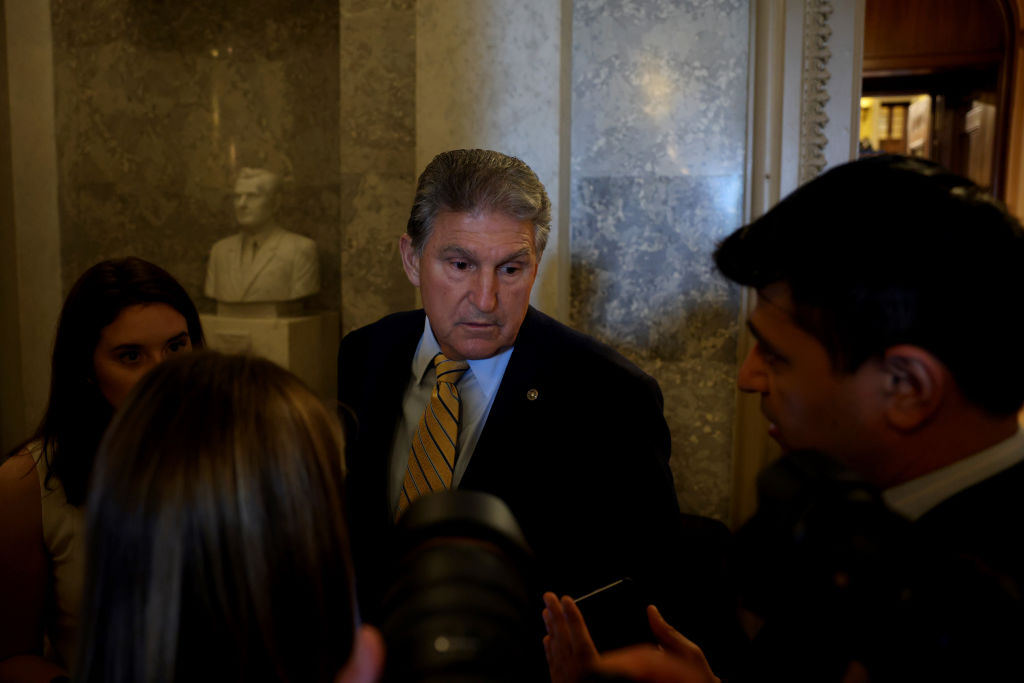Democrats aren't giving up on protecting voting rights, but their options are pretty limited


A free daily email with the biggest news stories of the day – and the best features from TheWeek.com
You are now subscribed
Your newsletter sign-up was successful
Democratic leaders vowed to continue pushing for federal legislation to protect and expand voting rights after Senate Republicans on Tuesday blocked debate on the For the People Act, the sweeping elections package Democrats have prioritized. "In the fight for voting rights, this vote was the starting gun, not the finish line," Senate Majority Leader Chuck Schumer (D-N.Y.) said after the GOP filibustered the bill. The White House said President Biden views ensuring voting access the "fight of his presidency."
But "Democrats are boxed in on their party's signature election reform plan," and "at the moment, the party doesn't have a backup plan on elections" or a path to change the filibuster, Politico reports. Both parties managed to keep their caucuses unified in Tuesday's 50-50 Senate vote, and Republicans have made it pretty clear they are not interested in a federal remedy to the voting restrictions GOP state legislatures are putting in place on the pretextual rationale that Republican voters are concerned about election security after Biden's 2020 victory.
"Discussions are ongoing among congressional Democrats on how to proceed," The Associated Press reports, including changing the filibuster. One possibility is exempting bills on elections and voting, making 41 senators from the minority party to show up to block legislation, and returning to the "talking" filibuster.
The Week
Escape your echo chamber. Get the facts behind the news, plus analysis from multiple perspectives.

Sign up for The Week's Free Newsletters
From our morning news briefing to a weekly Good News Newsletter, get the best of The Week delivered directly to your inbox.
From our morning news briefing to a weekly Good News Newsletter, get the best of The Week delivered directly to your inbox.
Sen. Amy Klobuchar (D-Minn.) said she will holding hearing to focus attention on some of the more than 30 restrictive voting laws that 18 GOP-led states have enacted since the 2020 election, according to the Voting Rights Lab. Democrats are also considering breaking up the legislation into popular chunks and forcing a vote on those narrower bills, and trying to enact some of their measures through party-line budget reconciliation.
Some Democrats are also more hopeful about the prospects for the John Lewis Voting Rights Act, expected to be ready in the fall. One Senate Republican, Lisa Murkowski (Alaska), has already endorsed that bill, which would restore federal oversight of state voting legislation to ensure it isn't racially discriminatory.
The John Lewis Act "faces an uphill battle in securing enough Republican votes for passage," election law scholar Richard Pildes writes in a New York Times op-ed Wednesday. "But because it is the only legislation with any bipartisan support so far, it might be the most plausible route for now to bolster national voting-rights policy — and to help bring greater legitimacy to our election process."
A free daily email with the biggest news stories of the day – and the best features from TheWeek.com
Peter has worked as a news and culture writer and editor at The Week since the site's launch in 2008. He covers politics, world affairs, religion and cultural currents. His journalism career began as a copy editor at a financial newswire and has included editorial positions at The New York Times Magazine, Facts on File, and Oregon State University.
-
 6 of the world’s most accessible destinations
6 of the world’s most accessible destinationsThe Week Recommends Experience all of Berlin, Singapore and Sydney
-
 How the FCC’s ‘equal time’ rule works
How the FCC’s ‘equal time’ rule worksIn the Spotlight The law is at the heart of the Colbert-CBS conflict
-
 What is the endgame in the DHS shutdown?
What is the endgame in the DHS shutdown?Today’s Big Question Democrats want to rein in ICE’s immigration crackdown
-
 Witkoff and Kushner tackle Ukraine, Iran in Geneva
Witkoff and Kushner tackle Ukraine, Iran in GenevaSpeed Read Steve Witkoff and Jared Kushner held negotiations aimed at securing a nuclear deal with Iran and an end to Russia’s war in Ukraine
-
 Pentagon spokesperson forced out as DHS’s resigns
Pentagon spokesperson forced out as DHS’s resignsSpeed Read Senior military adviser Col. David Butler was fired by Pete Hegseth and Homeland Security spokesperson Tricia McLaughlin is resigning
-
 Judge orders Washington slavery exhibit restored
Judge orders Washington slavery exhibit restoredSpeed Read The Trump administration took down displays about slavery at the President’s House Site in Philadelphia
-
 Hyatt chair joins growing list of Epstein files losers
Hyatt chair joins growing list of Epstein files losersSpeed Read Thomas Pritzker stepped down as executive chair of the Hyatt Hotels Corporation over his ties with Jeffrey Epstein and Ghislaine Maxwell
-
 Judge blocks Hegseth from punishing Kelly over video
Judge blocks Hegseth from punishing Kelly over videoSpeed Read Defense Secretary Pete Hegseth pushed for the senator to be demoted over a video in which he reminds military officials they should refuse illegal orders
-
 Trump’s EPA kills legal basis for federal climate policy
Trump’s EPA kills legal basis for federal climate policySpeed Read The government’s authority to regulate several planet-warming pollutants has been repealed
-
 House votes to end Trump’s Canada tariffs
House votes to end Trump’s Canada tariffsSpeed Read Six Republicans joined with Democrats to repeal the president’s tariffs
-
 Bondi, Democrats clash over Epstein in hearing
Bondi, Democrats clash over Epstein in hearingSpeed Read Attorney General Pam Bondi ignored survivors of convicted sex offender Jeffrey Epstein and demanded that Democrats apologize to Trump
